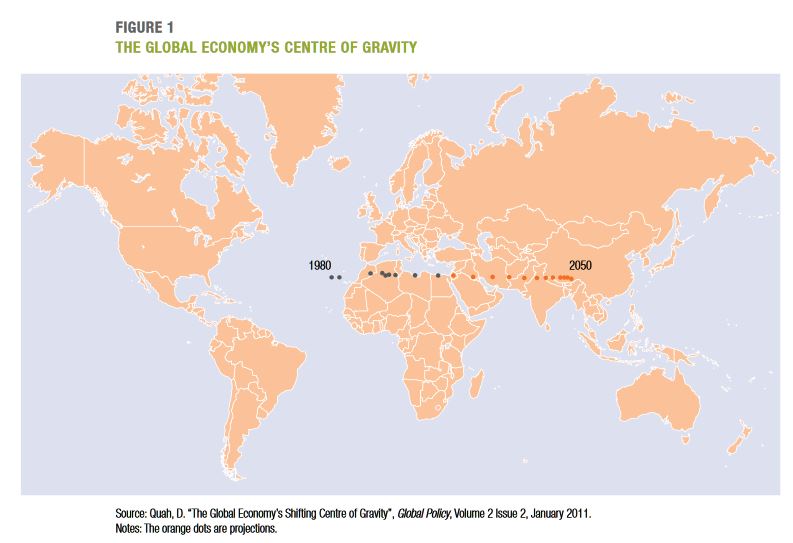From The Conversation.
The Committee for Economic Development of Australia (CEDA) has released a report titled Australia’s Place in the World, which considered how Australia should respond to changing attitudes to globalisation.
 At home and around the world, there is a backlash against free trade and globalisation. The report asks what course Australia should navigate through these choppy economic and political waters.
At home and around the world, there is a backlash against free trade and globalisation. The report asks what course Australia should navigate through these choppy economic and political waters.
The backdrop, of course, is the UK Brexit vote and the election of Donald Trump as US President.
If that’s not motivation enough, one could easily add to CEDA’s list: the performance of Marine Le Pen in France’s recent presidential election, the election of the far-right AfD to the German parliament, and the looming role of Pauline Hanson’s One Nation in the Queensland election.
Tariffs and trade
The report is broken into three sections: Global Economy, Global Security, and Global Governance, but it is the first and third that speak directly to Australia’s economic fortunes in the age of Trump.
One obvious, but correct and important observation the report makes is that Australia has been a huge beneficiary of free trade over the past 30 years. Not only have our exporters gained access to major overseas markets, but consumers in Australia have also benefited from reduced tariffs.
For example, the price of a typical sedan has basically halved in real terms due to the removal of a 100% car tariff. But while trade and globalisation have made the economic pie bigger, the sharing of those benefits has been much more uneven. Just ask manufacturing workers.
What is missing from the report’s recommendations is how to deal with and compensate the losers from globalisation in Australia. That is important, both economically and politically.
Global rise of populism
The rise of populist parties around the world has been associated with this failure to compensate globalisation’s losers.
Part of what it takes to address this issue is so-called “place-based policies” which Rosalind Dixon and I have previously discussed. Broadly, this refers to the people who are affected when industries move away from particular areas and employment opportunities dry up.
The CEDA report argues, however, that:
Policies such as moving from transaction taxes on property to broad-based land tax to address housing affordability and labour mobility need to be designed along with transition pathways. GST reform with a broader base to remove the need for stamp duty could be another option.
The report also points out that Australia’s company tax rate is uncompetitive, and that the proposed shift to a 25% rate under the Coalitition’s “Enterprise Tax Plan” would only happen by 2026-27, if it happens at all. These are all good points, and would make for good policy. Yet the only one that looks vaguely likely to happen is replacing stamp duty with land tax – and that would be done at a state government level.
The federal government floated the idea of GST reform and retreated almost immediately after the opposition predictably attacked it viciously and effectively as being “regressive”. The Enterprise Tax plan also looks to be in danger, as several crossbench MPs seem likely to side with Labor and want tax cuts only for small businesses. That’s utterly stupid economics, but apparently good politics.
Middle power leadership?
As the report notes: “Global cooperation is growing increasingly important in a world that faces a number of crises that require cross-border solutions.”
This is surely true, although the report paints a rosy picture of Australia’s potential role as a “middle power”, claiming that we were important in the establishment of the United Nations.
True, Australia played a relatively important role in establishing APEC and the G20. But that involved leadership from figures like Hawke, Keating and Rudd. I, for one, don’t see anyone on the present political landscape with those leadership and persuasion skills.
Perhaps the bigger challenge is that President Trump seems determined to radically undermine international institutions. Even Canadian Prime Minister Justin Trudeau was unhelpful in the Trans Pacific Partnership rebound effort that Malcolm Turnbull and others were trying to arrange.
What can Australia do in the face of orchestrated attacks on global institutions by the biggest and most important nations? Very little, I fear. The age of Trump is a difficult time for Australia and its leaders. Many things are out of our control.
What we can do, however, is resist the tide of populism at home, and provide stable and functional government. Both major parties have a patchy recent record in that regard, and the federal opposition has made some populist-type moves on trade and protectionism.
Let’s hope they don’t really believe it.
Author: Richard Holden, Professor of Economics and PLuS Alliance Fellow, UNSW


